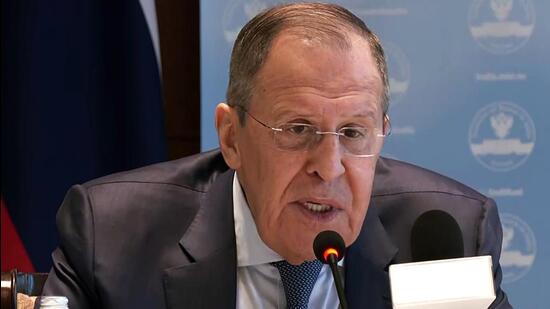Day after, Russia’s Sergey Lavrov spotlights alternative mechanisms to bypass sanctions
Russian foreign minister Sergey Lavrov’s remarks on efforts to sidestep the “illegal” sanctions come a day after US deputy national security adviser Daleep Singh warned of consequences for circumventing the Western sanctions for Ukraine invasion.
Russia has put in place mechanisms for payments in national currencies for transactions with India and other partners and their use will be intensified to bypass sanctions imposed by the West over the Ukraine conflict, Russian foreign minister Sergey Lavrov said on Friday.

Lavrov told the media after holding talks with his Indian counterpart S Jaishankar that Russia is ready to supply any goods that India wants to buy, and that the two sides will work out a way to sidestep the “illegal and unilateral sanctions” of the West, including for the supply of military hardware.
His remarks came a day after US deputy national security adviser Daleep Singh said there will be consequences for countries that attempt to circumvent the Western sanctions over Ukraine’s invasion. Singh also said the US doesn’t want to see any “rapid acceleration” in India’s imports from Russia of energy and other commodities.
Also Read: Jaishankar’s sharp comeback to India’s critics on buying cheaper Russian oil
Lavrov flew into India from China shortly after Daleep Singh concluded his talks with Indian interlocutors regarding the fallout of the Ukraine crisis and the wide-ranging sanctions imposed by the US and its partners to squeeze the Russian leadership and financial system.
Responding to several questions about the possibility of India and Russia switching to rupee-ruble trade to get around sanctions, Lavrov said Russia started moving from using dollars and euros to greater use of national currencies in dealings with India, China and other countries many years ago.
“Under the circumstances, this trend, I believe, will be intensified, which is natural and obvious,” he said. “We don’t want to depend on a system which would be closed anytime and we don’t want to depend on a system whose masters can steal your money overnight,” he added.
Also Read: The road ahead for India after abstention
Referring to Russia being shut out of the Society for Worldwide Interbank Financial Telecommunications or SWIFT banking system, Lavrov said his country began developing national payments systems over many years “when the nature of our Western partners, who are entirely unreliable, became more and more obvious”.
He added, “In Russia, the central bank, several years ago established a system of communication of financial information. India has a similar system, which is called RuPay and it is absolutely clear that more and more transactions would be done through these systems using national currencies, bypassing dollar, euro and other currencies which proved totally unreliable.”
People familiar with the matter said the two sides are looking at pegging their trade to a third currency in view of the recent volatility of the ruble and using banks that are largely outside the international financial system. A system for making payments for military equipment too is in place, the people said.
Asked about Moscow offering oil at discounted rates, Lavrov said Russia will be ready to supply “any goods which India wants to buy”. This includes oil supplies and high technology items. “If India wants to buy anything from us, we are ready to discuss and reach mutually acceptable forms of cooperation,” he said.
The solution for payments worked out by the two sides also relates to “military-technical cooperation”, he said, without going into details of specific defence deals.
India has been keen to ensure that the Ukraine crisis and the sanctions do not affect the supply of spares for the vast amount of Soviet and Russian military hardware used by the armed forces, or the delivery of weaponry such as the S-400 air defence systems.
Also Read: PM Modi calls for end to violence in Ukraine at meeting with Russian FM Lavrov
Lavrov said it was a “natural route” for Russia to decide to increase trade with India. The Russian side has been dealing with Western sanctions for many years and has the “experience of how to live in these conditions and we are fine and our partners are also fine in that”, he said.
Singh, perceived as the architect of US sanctions targeting President Vladimir Putin, his inner circle and the Russian financial system, on Thursday said there will be consequences for countries that “actively attempt to circumvent or backfill” the embargoes.
“We are very keen for all countries, especially our allies and partners, not to create mechanisms that prop up the rouble and that attempt to undermine the dollar-based financial system,” Singh added.
Pressure has been growing on India to shift its position on Russia – New Delhi has refrained from criticising Moscow’s invasion of Ukraine – and a string of Western leaders and senior officials such as Daleep Singh and UK foreign secretary Liz Truss have travelled to the Indian capital in recent days for consultations on the issue.






